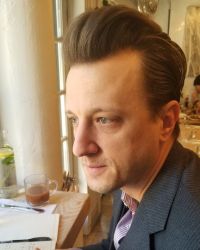To recognize the contributions postdoctoral researchers make to Case Western Reserve University—and their respective fields—The Daily has partnered with the Office of Postdoctoral Affairs on a new monthly series. Know an outstanding postdoc making an impact at CWRU or in their field? Nominate them to be featured in this series.

Aaron Hammes, a postdoc in the Department of English at the College of Arts and Sciences, focuses his research on contemporary transgender literature and sex work decriminalization, decarceration, and destigmatization.
Hammes earned his PhD in English at the Graduate Center of the City University of New York. At Case Western Reserve University, he’s conducting his postdoctoral work alongside Michelle Berger, director of the Baker-Nord Center for the Humanities.
Hammes is the author of three volumes of fiction (published by Bone & Ink Press), and is finishing a forthcoming manuscript on genre and transgender fiction titled TransGenre, to be published by Oxford University Press in 2024. Read Hammes’ recently published work.
In addition to his scholarly work, Hammes is involved with the Support Ho(s)e Collective, which aims to promote political education, mutual aid and individual defense campaigns for current and formerly sex-working people.
Get to know more about Hammes’ experiences as a postdoc.
Answers have been lightly edited for clarity and length.
1. What has been your best experience so far as a CWRU postdoc?
I’ve very much enjoyed ideating around the public humanities and how to communicate the relevance of the arts to students and community members alike. Case Western [Reserve] clearly values interdisciplinarity and mentorship in its humanities programs, and I’ve been pleased with how my values have aligned with those of my colleagues.
2. How do you think the postdoctoral experience at CWRU is helping you prepare and advance toward your goals?
Having space (literally and figuratively) to research and produce the work that interests me, as well as getting to participate in the workings of such a unique and vibrant cluster as the Baker-Nord Center for the Humanities, are each invaluable as I prepare for the job market. Professional and intellectual development are clearly both highly valued in my postdoctoral experience here.
3. What’s your best piece of advice on how postdocs can make the most of their postdoc career and prepare for their future goals?
Making personal and professional connections that can yield career-long relationships seems to me a big part of the postdoctoral experience. The liminal space between researcher, lecturer and faculty member is an unusual one in some ways, and embracing the ability to write and research without enormous demands from course load is really important.
As for the future, having fresh sets of eyes on job materials and advice from people with experience around hiring and search committees is another very useful element of the postdoc experience. I trust in the advice I’ve gotten around how to best position myself for future success.

